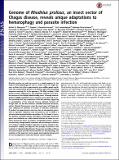Genome of Rhodnius prolixus, an insect vector of Chagas disease, reveals unique adaptations to hematophagy and parasite infection
Author(s)
Mesquita, Rafael D.; Waterhouse, Robert
DownloadMesquita-2015-Genome of Rhodnius p.pdf (1.011Mb)
PUBLISHER_POLICY
Publisher Policy
Article is made available in accordance with the publisher's policy and may be subject to US copyright law. Please refer to the publisher's site for terms of use.
Terms of use
Metadata
Show full item recordAbstract
Rhodnius prolixus not only has served as a model organism for the study of insect physiology, but also is a major vector of Chagas disease, an illness that affects approximately seven million people worldwide. We sequenced the genome of R. prolixus, generated assembled sequences covering 95% of the genome (∼702 Mb), including 15,456 putative protein-coding genes, and completed comprehensive genomic analyses of this obligate blood-feeding insect. Although immune-deficiency (IMD)-mediated immune responses were observed, R. prolixus putatively lacks key components of the IMD pathway, suggesting a reorganization of the canonical immune signaling network. Although both Toll and IMD effectors controlled intestinal microbiota, neither affected Trypanosoma cruzi, the causal agent of Chagas disease, implying the existence of evasion or tolerance mechanisms. R. prolixus has experienced an extensive loss of selenoprotein genes, with its repertoire reduced to only two proteins, one of which is a selenocysteine-based glutathione peroxidase, the first found in insects. The genome contained actively transcribed, horizontally transferred genes from Wolbachia sp., which showed evidence of codon use evolution toward the insect use pattern. Comparative protein analyses revealed many lineage-specific expansions and putative gene absences in R. prolixus, including tandem expansions of genes related to chemoreception, feeding, and digestion that possibly contributed to the evolution of a blood-feeding lifestyle. The genome assembly and these associated analyses provide critical information on the physiology and evolution of this important vector species and should be instrumental for the development of innovative disease control methods.
Date issued
2015-12Department
Massachusetts Institute of Technology. Computer Science and Artificial Intelligence LaboratoryJournal
Proceedings of the National Academy of Sciences
Publisher
National Academy of Sciences (U.S.)
Citation
Mesquita, Rafael D., et al. "Genome of Rhodnius Prolixus, an Insect Vector of Chagas Disease, Reveals Unique Adaptations to Hematophagy and Parasite Infection.” Proceedings of the National Academy of Sciences vol. 112 no. 48
(December 2015) 14936–14941.
Version: Final published version
ISSN
0027-8424
1091-6490